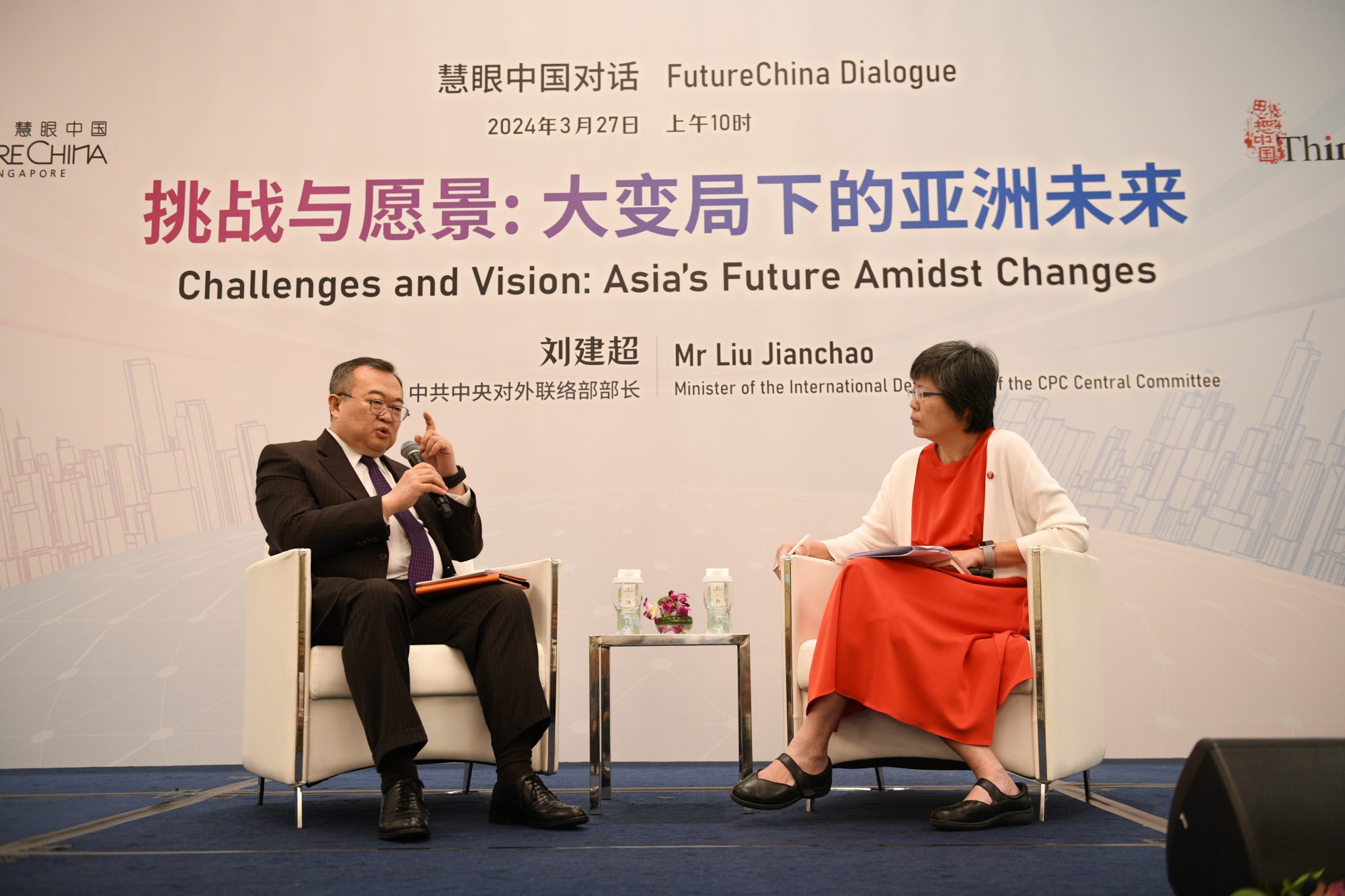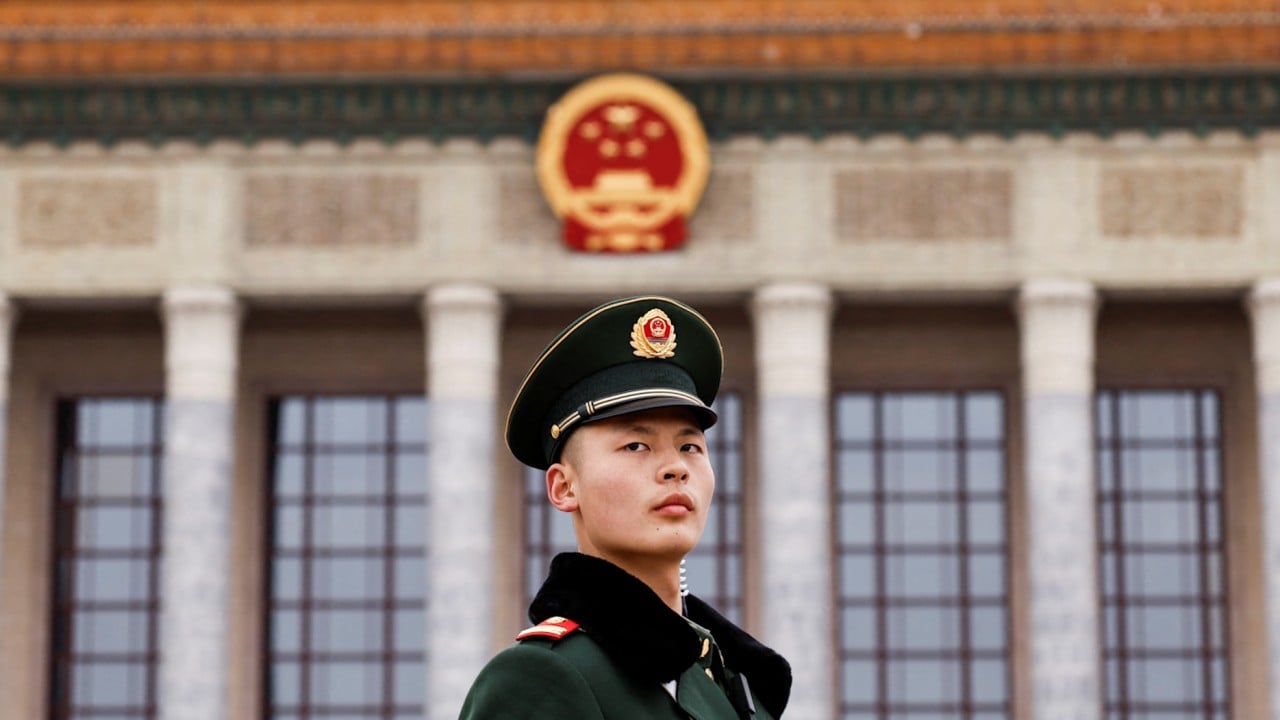
US should not ‘oppress and contain’ China, globalisation facing ‘headwinds’: top Beijing official
- Asia should guard against becoming ‘testing grounds for parallel systems’, says Liu Jianchao, who is tipped to be China’s next foreign minister
- During his visit to Singapore to reaffirm bilateral ties, Liu met top officials including Deputy Prime Minister Lawrence Wong
“However, for some time, the trend of economic globalisation has encountered headwinds,” said Liu, who hailed the twin engines of economic globalisation and regional integration for their “potential and resilience for growth”.
Liu said, “Asia must be vigilant not to become testing grounds for parallel systems. If so, the long-established industrial supply chains in the region could be disrupted and Asia can find it harder to achieve prosperity.”
Although Liu did not elaborate, parallel systems refer to a global political and economic order simultaneously dominated by different powers, with the US-China rivalry cited by political analysts as a prime example.
US visit firms speculation Liu Jianchao will be China’s next foreign minister
Liu, 60, was speaking at a dialogue in Singapore on the challenges of Asia’s future, co-hosted by non-profit organisation Business China and Singapore Chinese-language daily Lianhe Zaobao.
The event was part of his four-day trip to the city state, where he met Singapore’s top leaders.
Liu is widely seen as the leading contender to be China’s next foreign minister. His six-day visit to the US in January had helped reduce tensions over Taiwan, according to analysts, who noted his trip attracted “an unprecedented level of attention”.
In his latest speech, Liu went to great lengths to stress that China remained a staunch supporter of economic globalisation and regional integration. “The Chinese economy is deeply integrated into the world economy. We will open our door wider.”
He said that China also stood “ready to work with Singapore and other Asian countries” in advanced technology and innovation to grasp new opportunities.

While Liu did not make direct mention of the US in his speech regarding economic policies, he named the country in response to questions on the US-China rivalry.
One of the reasons US-China relations remained rocky was because “the US had not abandoned its policy to oppress and contain China”, Liu said in response to a question on where relations between the two superpowers were headed.
The best way to mend ties was to promote dialogue and communication, which could enhance the perception that the US had of China, he argued.
On the possibility of another Donald Trump presidency, Liu said the Chinese government would “have to cooperate with whoever is elected into office”.
“If we can reach more points of consensus in the future and improve our relations then that is something we definitely want to see,” he said. “We hope that whoever is elected as president of the US will continue to establish a positive perception of China.”
On Tuesday, Liu called on Singapore’s deputy prime ministers Lawrence Wong and Heng Swee Keat, reaffirming the “warm and long-standing relations between both nations and said he looked forward to “further strengthening bilateral cooperation”, according to a statement released by Singapore’s foreign affairs ministry.
Heng and Liu welcomed the “strong momentum in bilateral cooperation, and reaffirmed both sides’ commitment to continued high-quality and forward-looking collaboration in both traditional and emerging areas”.
The two countries could also work closer with regional and international partners to tackle shared challenges such as climate change, the statement read.
This year also marked the 30th anniversary of the Suzhou Industrial Park, which is the first government-to-government project between both sides, the officials from both countries had noted, expressing confidence in the project’s “continued growth and development”.
“They also agreed that despite the differences in size and socioeconomic contexts of both countries, there was much that each side could learn from the other to address the needs of our populations and uplift their lives,” the statement from the Singapore ministry read.
Singapore minister’s visit to Palestinian territories a ‘visible gesture’
Liu’s visit coincides with the arrival of China’s new ambassador to Singapore Cao Zhongming, replacing predecessor Sun Haiyan who has been promoted to deputy minister in the Communist Party’s International Liaison Department following a mere 14-month stint in the city state.
In written remarks upon his arrival on March 24, Cao said bilateral ties had always been “forward-looking, strategic and demonstrative”, and mutually beneficial to both countries.
He also expressed his admiration for Singapore and its transformation into “a global hub for trade, finance, shipping, and aviation in just over half a century”.
He pledged his commitment to do “his utmost” to push for “high quality” ties between Singapore and China.
“As close neighbours, China and Singapore have enjoyed time-honoured friendly exchanges. I will do my utmost and work with friends from all walks of life in Singapore to make ‘high quality’ the most distinct feature of China-Singapore cooperation,” he wrote in a statement on Facebook.
China and Singapore also recently agreed to kick-start a mutual 30-day visa-free travel arrangement, which took effect in January.


